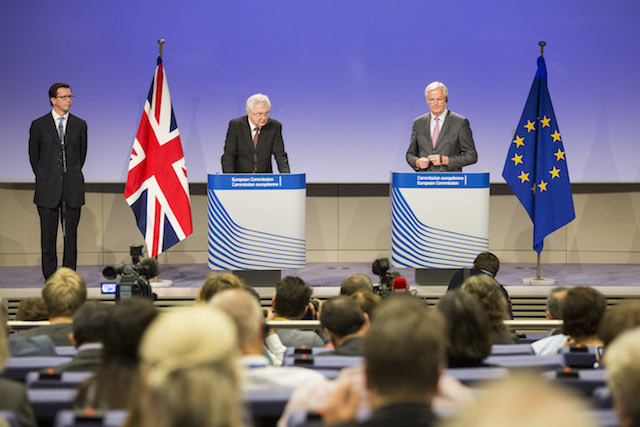Both Davis and Barnier insisted the discussions had been constructive.
Davis credited prime minister Theresa May’s speech in Florence with bringing a new dynamic into the negotiations. He said that decisive steps had been taken, and that “considerable progress” had been made in this “vital” round of negotiations. Davis said that the period of transition was important so that citizens and businesses only had to experience one set of changes.
The joint technical note on citizens’ rights reveals that out of 60 issues, 35 have been agreed on. However, 12 issues are still coded red, while 3 are up for discussion in the governance group.
Talking about areas in which agreement had been reached, Davis said that the UK had agreed to adapt EU law into national UK law on citizens’ rights enforcement. He said the “ECJ would play an indispensable role in ensuring this system”, but ruled out the European Court of Justice having direct jurisdiction. However, the joint technical note states that the UK must clarify this point.
The two sides agreed that “EU law concepts used in Withdrawal Agreement interpreted in line with CJEU case law as at the point of the UK’s withdrawal.”
The UK still has to clarify the cut-off date by which EU citizens lawfully resident in the UK become third country nationals. The EU’s position is that it should be the date of the UK’s withdrawal, while the UK’s position is that it lies “between the date of article 50 trigger and the date of exit.”
Both agreed as well on cross-border workers, an important issue that concerning people in Northern Ireland/Ireland and France/UK. There has also been agreement on current family member’s residence rights. However, the issue of future family members joining a European citizen legally resident in the UK is still flagged in red. The UK’s position is that:
“Equal treatment as between EU and British citizens as regards applicable rules. Future family members will be subject to the same rules that apply to non-‐EU nationals joining British citizens, or alternatively to the post-‐exit immigration arrangements for the EU citizens who arrive after the specified date.”
The EU argues on the contrary that this is an "issue of preserving rights under EU law."
There has been agreement that residence shall be granted under the conditions laid down in the withdrawal agreement with no further discretion. Furthermore, these rights benefit from life-long protection.
However, they disagreed on further free movement of rights. The EU states that:
“UK nationals in scope of withdrawal agreement only have protected rights in the state(s) in which they have residence rights on exit day, without prejudice to Social Security rights.”
The UK position is that:
“UK nationals in scope who move within EU27 after the specified date should keep all existing rights; also for cross-‐border activity begun after the specified date.”
It continues that:
“The UK is prepared to offer a guaranteed right of return for those who have acquired permanent residence status. This offer is subject to addressing the question of further free movement of UK nationals across the EU27.”
There is also disagreement on criminality checks, on administrative procedures, on whether current holders of permanent residence certificates have to apply for updated UK documentation or not.
Social security rights, healthcare and pensions have been mostly agreed on, except the export of other benefits.
On professional qualifications, there are still outstanding issues.
Financial settlement inseparable from citizens’ rights and Northern Ireland
Michel Barnier reiterated his position that first, “sufficient progress must be made” on the three divorce issues, namely citizens’ rights, financial settlement, and the Northern Ireland border.
He said:
“The UK explained also that it is not in a position yet to identify its commitments taken during membership. For the EU, the only way to reach sufficient progress is that all commitments undertaken at 28 are honoured at 28.”
Barnier said in answer to a media question that the issue of the financial settlement could not be dissociated from citizens’ rights and the question of the Northern Ireland border. There was no “possible link between discussions on the new partnership (on trade, terrorism etc) and the financial settlement.”
He said that it had been a constructive week, but that there had not yet been sufficient progress to move to the next stage, and that it would take weeks, if not months. The October European Council was the opportunity to talk to everyone.
The next negotiation round is scheduled for 9 October.
